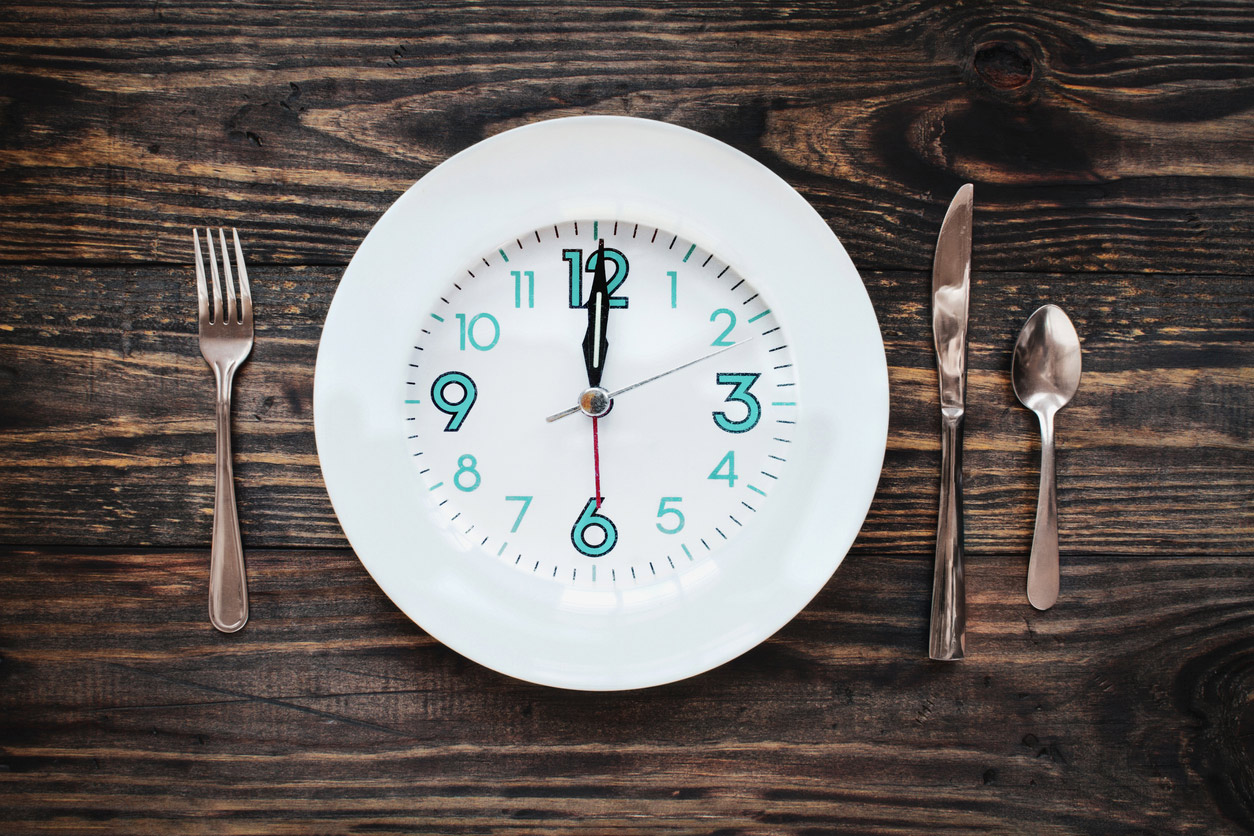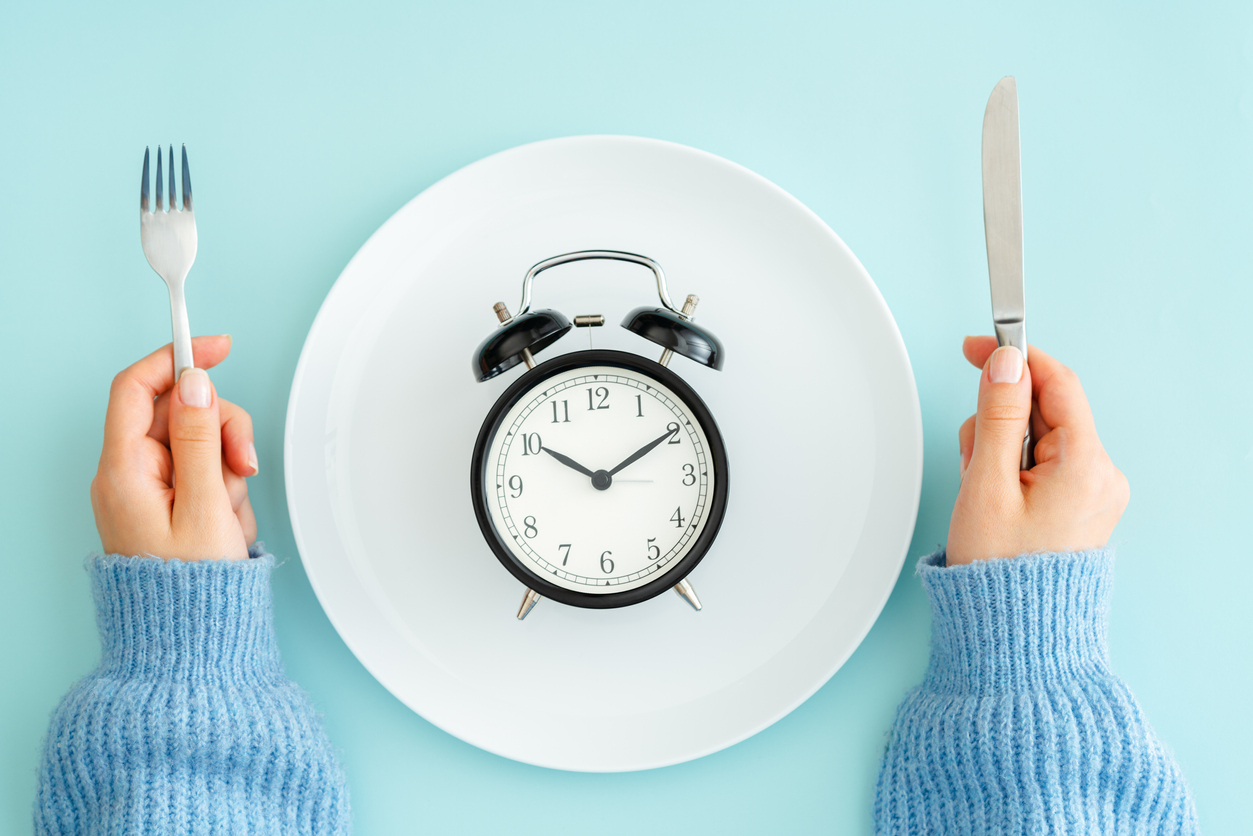Like many people, I found myself gaining weight this past year. Between staying home and cooking more, as well as the stress of the pandemic and getting older, the pounds on the scale seemed to be creeping up.
My doctor confirmed that I had put on excess weight when I went for my annual checkup. Given that I am in my mid-50s, I knew weight loss might be more of a struggle than when I was younger. My doctor suggested that I try intermittent fasting (or IF) to get my BMI in a healthier range. She said that she had other midlife patients in her practice that had given IF a try with good results.
I wasn’t sure how I felt about incorporating fasting into my lifestyle, but I decided to think about it.
How to Do Intermittent Fasting
A brief overview of IF is that a person “fasts” certain hours/days of the week. Some people like the 16:8 approach where they fast for 16 hours daily and eat for 8 hours. When fasting, only water, coffee, and other non-caloric beverages are allowed.
Another method of IF is fasting for a full 24 hours. Fasting can be done on alternate days or on a 5:2 approach. With the 5:2 approach, the person eats normally for five days and fasts for two days. On fasting days, a woman should consume no more than 500 calories (men can go up to 600 calories) and drink non-caloric beverages such as black coffee, tea, and water.
On the days people eat (or feast days), they should eat regular portions of healthy foods and not over-indulge.
Why Intermittent Fasting Helps You Lose Weight
The most straightforward reason IF works for weight loss is the assumption that you consume fewer calories overall if you eat for fewer hours.
According to an article by the Harvard School of Public Health, “A systematic review of 40 studies found that intermittent fasting was effective for weight loss, with a typical loss of 7-11 pounds over ten weeks. There was much variability in the studies, ranging in size from 4 to 334 subjects and followed from 2 to 104 weeks. It is important to note that different study designs and intermittent fasting methods were used, and participant characteristics differed (lean vs. obese).”
Why Some People Don’t Lose Weight on IF
The biggest reason people may not have success with IF is that they are not eating correctly during their “eating hours.” While the premise of intermittent fasting focuses on when you eat, what you eat does matter. If you primarily consume processed foods, white carbohydrates, or high-sugar foods, the odds are you won’t lose weight. Also, eating sugary foods will likely make you crave them during your fasting hours.
The focus during eating hours should be on lean protein and fiber-rich foods such as fruits and vegetables. These foods will help you to stay satiated.
While you don’t need to count calories during your eating hours, you do need to make healthy choices and not use the eating window as a chance to overindulge. It’s equally important to consume enough calories during the eating window. If you don’t, the body can go into starvation mode and conserve energy rather than burn fat.
Another issue is that you really have to fast during the fasting window. That means no cream in your coffee or any calories of any kind. The exception is the new Fast Bar that a company called L-Nutra developed based on 25 years of research at the University of Southern California Longevity Institute. You will want to read up on the research around Fast Bar, which is truly amazing (and you can use code PRIME to get an additional $10 off any offer!). While the bars have 200 calories or more, they do not break your fast – a great way to find success using the 16:8 method.
Helpful Tips on How to Lose Weight Using Intermittent Fasting

See your doctor
Before making any diet or lifestyle change, you should see your doctor. For people with certain conditions, IF may not be the best choice for their overall well-being.
Prepare for meals at home
Before you start, plan out your meals and snacks for the week. Make a food shopping list, so you are stocked up on healthy choices for fasting. Clean out your fridge and pantry so that you aren’t tempted to eat unhealthy foods you have trouble resisting. If it’s not in the house, it’s harder to eat it.
Prepare for meals out
Planning includes looking at your schedule for the week. Do you have a wine night with friends on the calendar or a business dinner you must attend? If so, plan accordingly. It is easy to check out menus online in advance to figure out what you will eat, and this way, you are less likely to be swayed by what your dinner companions order.
Consider Tracking What You Eat and How You Feel
Keeping a food journal either on your phone or in a book is helpful. Many times we don’t realize what we have eaten or how much. Did you overindulge because you did not get enough sleep, or did a bad day at work cause you to drink two glasses of wine instead of one? Writing down what we eat, why we eat it, and how we felt afterward can be beneficial and aid people in making better choices in the future. You can even consider an app like PLATE to help you track what you should eat and know you’re actually consuming the appropriate calories during the day to lose weight. The PLATE app will also notify you when to start your fast and when to break it based on the hours you’ve chosen.
Yes, You Will Be Hungry

At least at the start as your body gets used to fasting. There is a product available that you can eat without breaking your fast, Fast Bars. It may take a few weeks to adjust to the feeling of not eating the minute hunger strikes. Which brings us to …
Drink, Drink, Drink
Sometimes, we mistake thirst for hunger. It’s critical to stay hydrated on both fasting and non-fasting days. Hydration will keep you fuller for longer and help you stay focused on your goals. Remember, caffeine dehydrates, so while it is OK to drink coffee, balance it out with flat or sparkling water.
Exercise is Important Too
Don’t use intermittent fasting as an excuse not to keep moving. Regular exercise and getting a good night’s sleep will help you stay on track with your IF eating program and reach your weight loss goals. If it’s been a long time since you’ve workout consider taking our 30-day Fitness Challenge.
Don’t Be Afraid to Indulge in Moderation
One reason people have success on IF is because of the flexibility. Unlike a KETO diet or a Paleo Diet, no specific food is off-limits. If you are at a birthday party, you can eat a piece of cake and not feel like you have fallen off the IF wagon. It’s just important to keep indulgences in check and focus primarily on healthy choices.
Try Not to Get Frustrated
People who have tried intermittent fasting see it as a lifestyle, not a diet. They also don’t beat themselves up if they have had an off day. If you find yourself over-indulging one day, you can get back on the program without feeling like you have failed. And while the scale is a helpful tool, remember weight fluctuates daily, so don’t get discouraged if you go up or down a few pounds on your road to success.

If you have a hard time sticking with a plan on your own try Prolon. It’s a 5-day fast with food that most people lose 5 lbs on.







